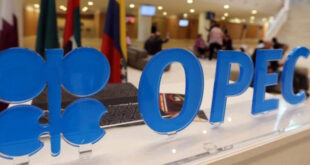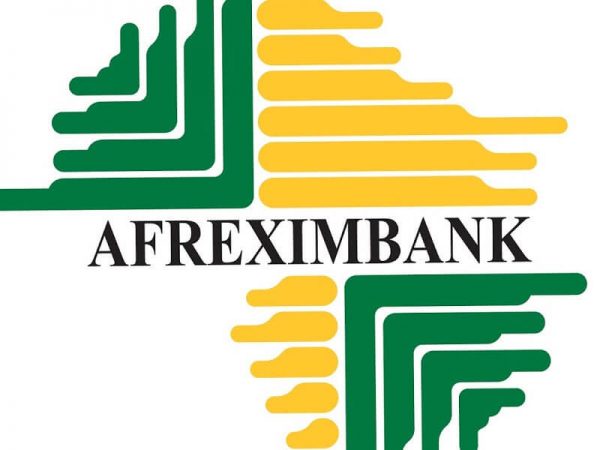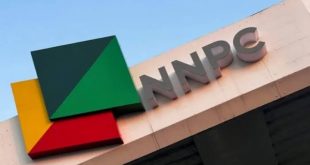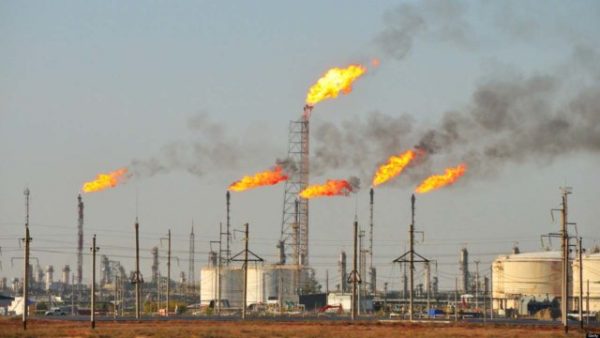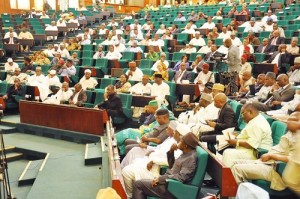
Strong indications emerged last week that the Senate would propose that the oil benchmark for the 2015 budget be reduced to $40 per barrel in line with the reality of falling crude prices in the international market.
The Minister of Finance, Dr. Ngozi Okonjo-Iweala, had presented a national budget size of N4.357tn based on a projected oil production figure of 2.2 million barrels per day and a benchmark price of $65 per barrel.
However, few days after the document was submitted to both chambers of the National Assembly, there was a drastic fall in crude oil prices in the international market, which many commentators said had made the adoption of the $65 unrealistic.
Some senators, who spoke with newsmen in Abuja, revealed that notwithstanding the fall in crude oil prices, the upper legislative chamber would still proceed with the discussion on the Medium Term Expenditure Framework and Fiscal Strategy Paper (MTEF/FSP) by determining a realistic benchmark oil price.

The Chairman, Senate Committee on Finance, Senator Ahmed Makarfi, and his counterpart in the Rules and Business Committee, Senator Ita Enang, told newsmen that the National Assembly did not need the executive to dictate a benchmark price for the 2015 budget.
According to Enang, “We do not need a revised MTEF/FSP from the executive because of the crash in oil prices in the international market. It is our responsibility to look at the budget against the current market forces and determine an appropriate benchmark.
“In my own opinion, I believe that the benchmark should be fixed at $40 per barrel in line with the prevailing oil prices in the international market”
Makarfi said, “It is now the responsibility of the National Assembly to decide whether we will approve the oil benchmark as submitted by the executive or fix a new one. We do not need to wait for another benchmark from the executive before we start work on the budget.”
Other senators, who spoke with newsmen on condition of anonymity, confirmed that the benchmark would be reviewed downward to reflect the reality on the ground.
The Senate Notice Paper, which was sighted by some newsmen, indicated that the Senate would deliberate extensively on the MTEF/FSP, the budget proposal and the Petroleum Industry Bill, when the resume from Christmas and New Year holiday.
The Deputy Senate President, Ike Ekweremadu, had on Monday last week said the 2015 budget and the Constitution Amendment Bill would receive the attention of the Senate upon the resumption of plenary session.
Meanwhile, oil prices continued their decline into near six-year lows with the global benchmark Brent crude plunging below $45 per barrel, about $20 lower than Nigeria’s budget benchmark price for the year.
The further decline in prices came after the United States investment bank, Goldman Sachs, cut its three-month forecast for Brent crude to $42 per barrel from $80, and slashed its 2015 Brent forecast to $50.40 per barrel from $83.75.
Goldman said in a report that despite declining investments in the US shale oil, the main driver of the current supply glut, production would take longer to come down.
For more than a month now, Brent has been trading below the 2015 budget benchmark price of $65 per barrel, after hitting a peak of $115 in mid-June 2014.
Industry experts have stressed the need to further review the country’s budget benchmark for this year, adding that the oil price looked set to decline further amid supply glut and weak demand.
The continued decline in oil prices had forced the Federal Government to adjust the benchmark price for the budget twice from $78 to $73, and later to $65.
The Managing Director and Chief Executive Officer, Financial Derivatives Company Limited, Mr. Bismarck Rewane, said in a chat , “The safe benchmark price should be $50 per barrel because I don’t think the oil price will rise anytime soon. It is ridiculous for you to set the benchmark above the current spot price. If the benchmark is $50 and market price increases, we can then raise the benchmark.”
Last week, BNP Paribas SA had cut its oil price forecasts, saying it expected Brent to average $60 per barrel this year, down from its November assumption of $77 per barrel.
Commerzbank lowered its first-quarter Brent forecast to $45 per barrel from $65 and cut its year-end price to $75 per barrel, from $80.
For the Director-General, West African Institute for Financial and Economic Management, Prof. Akpan Ekpo, the safe budget benchmark price for Nigeria is $40 per barrel.
Asked if the government would be willing to further reduce the benchmark, he said, “It is in their interest to do it. We have to reduce our dependence on oil. To be a strong economy, you don’t depend so much on an exogenous source of revenue. The price of oil is something we don’t have control over and the production level is determined by OPEC.”
An energy economist, Akin Iwayemi, said the benchmark needed to be reviewed to reflect the current reality in the oil market.
“It will be foolhardy to stick to a price that is far above what the current reality is. The oil market is in a state of flux. The price decline trend is likely going to continue because demand from Asia is not going to increase soon and there is so much supply in the market.”
Iwayemi added that the fact that the government had reviewed the benchmark price twice showed that it also wanted to reflect some realism in the price.
An energy specialist at Ecobank Capital, Mr. Dolapo Oni, said, “The safe point for our benchmark will be $50, but that will leave a lot of revenue gap to fill, especially since the government is keen to avoid debts rising too fast.”
An energy expert and Senior Lecturer, Energy Law, University of Lagos, Dr. Dayo Ayoade, said the oil price could decline further to $40 per barrel as Saudi Arabia had decided to defend its market share, adding that “the 2015 budget benchmark of $65 is extremely optimistic and is not a very good price.”
US investment bank, Morgan Stanley, had in a recent report, said oil prices could fall as low as $43 per barrel this year.
Also, credit ratings group, Standard & Poor’s, said it expected Brent crude to average $55 per barrel this year, down from a previous estimate of $70 per barrel.
“The further downward revisions reflect the severe near-term price impact of unconstrained oil supply and weaker global demand,” Standard & Poor’s said in a note.
The Minister of Finance, Dr. Ngozi Okonjo-Iweala, had in the overview of the 2015 budget proposal dated December 17, 2014, said, “We recognize that prices might still fall further but we do not intend to revise the price further down as price intelligence indicates that prices might average between $65 and $70 per barrel in 2015. This is, however, not an ironclad guarantee. So, if prices fall outside this range, the government will have to introduce further measures.”
Okonjo-Iweala, who noted that 2014 was a difficult budget year, said fiscal outlook over the mid-term 2015-2017 would also be equally challenging.
“As the international oil market evolves, crude oil prices may probably never reach $100pb again. So Nigeria really needs to continue the diversification drive and ‘reset’ the mind of every Nigerian to the emerging non-oil economy we need to build,” she said.
 MMS PLUS NG – Maritime, Aviation, Business, Oil and Gas News Online Newspaper with coverage in Maritime, Oil and Gas, Aviation, Power and Energy as well as Financial News
MMS PLUS NG – Maritime, Aviation, Business, Oil and Gas News Online Newspaper with coverage in Maritime, Oil and Gas, Aviation, Power and Energy as well as Financial News




